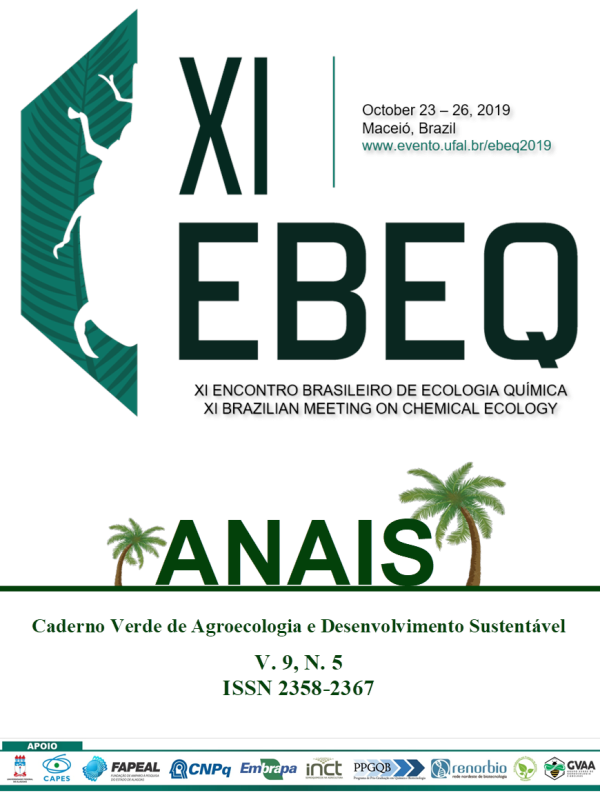THE ROLE OF THE HOST VOLATILES IN THE REPRODUCTIVE BEHAVIOR OF Ceratitis capitata
Keywords:
SEMIOCHEMICALS, KAIROMONES, MEDITERRANEAN FRUT FLYAbstract
Ceratitis capitata is the most invasive species of fruit flies of economic importance, due to its capacity to develop in several host fruits around the world. The damages caused to fruits are related to mated females oviposition, making the commerce of fresh fruits unviable and thus causing major losses to fruit producers. The use of pesticides is being the main methodology used to control several species of fruit flies, however, the indiscriminate use of these substances is causing a series of damages to environment and man. Therefore, the development of techniques which are environmental safe and economic viable should be implemented aiming to diminish the population growth of this species. The use of Volatile Organic Compounds (VOCs), released by host fruits, have emerged as an alternative strategy to control fruit flies species since these substances can be used as attractants for mated females or enhancer of sexual performance in males. Thus, the present study aimed: (I) to evaluate the attraction of females to formulations containing volatile compounds common to sex pheromone of C. capitata males and its host fruit, guava; (II) to determine if the exposition of virgin males to formulations containing volatile compounds common to sex pheromone of C. capitata males and its host fruit, guava increase the performance sexual of these males. The results demonstrated that females were attracted to individual formulations of α-copaene, β-caryophyllene, (R)-(+)-limonene and ethyl octanoate. In addition, these females were as much attracted to formulations containing mixtures of two and five components as they were attracted to guava extract. Males exposed to β-caryophyllene copulated more than non-exposed males, showing that this compound contributes to increase the sexual performance of virgin males of this species.Downloads
Published
How to Cite
Issue
Section
License
Termo de cessão de direitos autorias
Esta é uma revista de acesso livre, em que, utiliza o termo de cessão seguindo a lei nº 9.610/1998, que altera, atualiza e consolida a legislação sobre direitos autorais no Brasil.
O(s) autor(es) doravante designado(s) CEDENTE, por meio desta, publica a OBRA no Caderno Verde de Agroecologia e Desenvolvimento Sustentável, representada pelo Grupo Verde de Agroecologia e Abelhas (GVAA), estabelecida na Rua Vicente Alves da Silva, 101, Bairro Petrópolis, Cidade de Pombal, Paraíba, Brasil. Caixa Postal 54 CEP 58840-000 doravante designada CESSIONÁRIA, nas condições descritas a seguir:
O CEDENTE declara que é (são) autor(es) e titular(es) da propriedade dos direitos autorais da OBRA submetida.
O CEDENTE declara que a OBRA não infringe direitos autorais e/ou outros direitos de propriedade de terceiros, que a divulgação de imagens (caso as mesmas existam) foi autorizada e que assume integral responsabilidade moral e/ou patrimonial, pelo seu conteúdo, perante terceiros.
O CEDENTE mantêm os direitos autorais e concedem à revista o direito de divulgação da OBRA, com o trabalho simultaneamente licenciado sob a Licença Creative Commons do tipo atribuição CC-BY.
O CEDENTE têm autorização para distribuição não-exclusiva da versão do trabalho publicada nesta revista.
O CEDENTE têm permissão e são estimulados a publicar e distribuir seu trabalho online (ex.: em repositórios institucionais ou na sua página pessoal) a qualquer ponto antes ou durante o processo editorial, já que isso pode gerar alterações produtivas, bem como aumentar o impacto e a citação do trabalho publicado.








